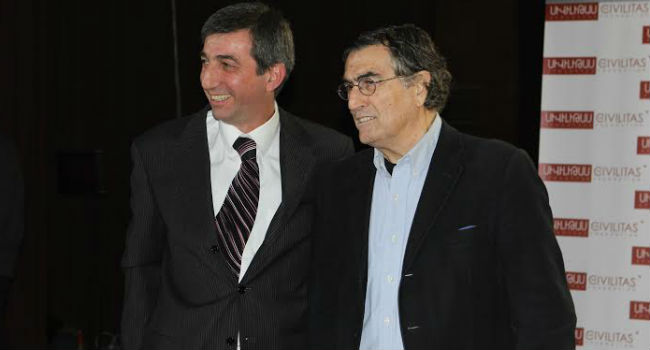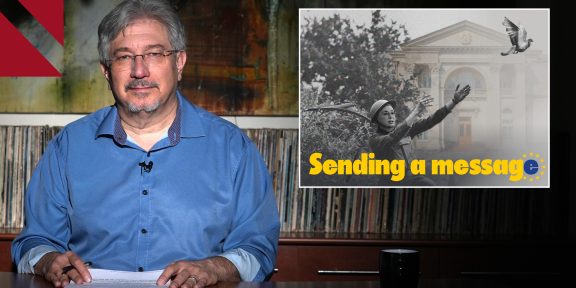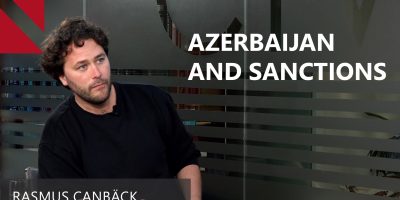 Armen Gevorgyan and Hasan Cemal. Gevorgyan is the grandson of Artashes Gevorgyan, who is one of the avengers, participant of “Nemesis” operation.
Armen Gevorgyan and Hasan Cemal. Gevorgyan is the grandson of Artashes Gevorgyan, who is one of the avengers, participant of “Nemesis” operation.
Hasan Cemal, author of “1915: The Armenian Genocide,” was the guest of the Civilitas Foundation for its Climbing the Mountain program on December 11. Hasan Cemal is the grandson of Cemal Pasha, one of the masterminds of the 1915 Armenian Genocide. The following day, Hasan Cemal was the guest of CivilNet’s “Turkey as it is” program and answered Alin Ozinian’s questions.
Aline Ozinian: Welcome to CivilNet. I’m Alin Ozinian and my guest today for “Turkey as it is” program is Turkish writer and commentator Hasan Cemal, who is the grandson of Cemal Pasha, one of the masterminds of the Armenian Genocide. Hasan Cemal is in Yerevan these days within the framework of the “Climbing the Mountain” program by the Civilitas Foundation.
Welcome, Mr Hasan. You participated in the “Climbing the Mountain” program and you told your story of progress towards recognizing the Armenian Genocide. We received some positive feedback, but there were also some concerns that appeared when you were talking about your meeting with the grandson of one of the assassins of your grandfather Cemal Pasha. You used the word “çete” (bandit) to describe those people. This word hurt the Armenians. Why did you use this word?
Hasan Cemal: I don’t know. I used that word on that moment. Maybe I should have said a group, or an organization. I think I said much more important things that underline the importance of dialogue in my one hour conversation. Perhaps they needed something to undermine this entire thing. I didn’t know any other way to call it in Turkish; maybe I should have said a group.
Aline Ozinian: Of course we know how difficult it is to call 1915 a genocide in Turkey and to speak about it loudly. Do you think that the audience wasn’t ready to hear this word from a person who recognizes the Armenian Genocide?
Hasan Cemal: I know how much pain these things cause for Armenians, how deep it is. That is the reason I wrote this book. But I repeat, it is not right to “stick to a word” and turning it into a target without reading my book and knowing who I am. Try to look at things from my point of view too. What to call those who killed my grandfather, should I applaud them? Shouldn’t I feel sorrow for my murdered diplomat friends? I want that Armenians also understand that my sorrow is also natural. However, what I have said doesn’t prevent me from understanding history correctly and being able to say genocide. I want to be fair while interpreting the history. We should be able to talk with each other, understand each other, and be in contact with each other. Without having contact we cannot rebuild dialogue. If we put this great struggle aside and concentrate on this one word that would be an obvious sign that you don’t want to restore dialogue between the two societies.
Aline Ozinian: Do you think that there was a deliberate focus on the word “bandits”?
Hasan Cemal: After the end of the “Climbing the Mountain” program in Cinema Moscow, and today at the meeting that I had with students in the Yerevan State University Faculty of Oriental Studies, also by analyzing today’s Armenian media, I understood that nationalism is quite strong and sometimes it is interrupting free contact. It is like this also in Turkey, which makes our life harder. Today I am saying it’s genocide; another person might not call it a genocide. Now would you refuse to have contact with that person? But perhaps that person would understand that it was genocide after being in contact with you. If you say that I won’t speak to you, if you don’t say it’s genocide, then you are putting a precondition. Such conditions, at this stage, won’t lead us towards a solution.
Aline Ozinian: You’re right. There are nationalists in both countries, but on the other hand, there is a case, a pain, a wound, which hasn’t healed in 100 years. Moreover, the Turkish state continued its anti-Armenian policies through the “properties tax” imposed on Armenians, the atrocities of September 6-7, the tragic murder of Hrant Dink and his theatrical lawsuit, the unknown killer of the Armenian conscript in the Turkish army Sevag Balikci, and the killings of old Armenian women in Kumkapi neighborhood of Istanbul that has a large Armenian population. Turkey doesn’t seem trustworthy anymore. All these anti-Armenian policies is creating more doubts inside Armenians. Therefore, they are thinking that you have come to Armenia with a secret agenda. Can you understand this rightful doubt?
Hasan Cemal: I am a person, a writer, who has always criticized the Turkish governments, and I am not alone. There are many people like me. When Erdogan said “They have called me, pardon me saying this, an Armenian!” we criticize such behavior for sure. For many years, we have tried to introduce changes in the Turkish school textbooks, especially regarding the Armenian cause. We also criticize the state language and ideology, which is quite far from peace and it doesn’t accept Armenian identity as an equal identity. After having struggled against all these, now I am able to write Genocide on the book that I have published, which, I think, is progress. The political climate in Turkey is changing, but this is not a guarantee that everyone is progressive. I myself have problems in Turkey. Many people aren’t accepting what I am saying, but I stress the fact that we are able to sit with people of opposing views under the same roof, living in the same country. I came to Yerevan having this in my mind and I stressed the importance of the meeting with Armenians.
Aline Ozinian: Mr Hasan, in the last several years people have started to discuss 1915 more freely. Some people are even calling it a genocide. On April 24, commemoration events are taking place in different Turkish cities. There are even petitions calling to apologize to Armenians. Aren’t all of these initiatives making the genocide meaningless? I mean, if these people are saying genocide, or ‘yes we share your pain,” will it all end with that? To be more precise, should we regard all these as an attempt by Turks to get rid of the weight of the genocide and close the issue? Or is this just the first stage of a recognition process that includes different layers and stages. Is this a way to get rid of the pressure from the Armenians?
Hasan Cemal: After Hrant Dink’s murder, 30 thousand people signed under the statement of apology from Armenians. This had a very important meaning for Turkey. It wasn’t easy to gather 30 thousand people on that thing. The term “Mets Yeghern” that is often used by the US president, was used in that statement, but not the word Genocide.
Aline Ozinian: Why?
Hasan Cemal: Because it is a taboo in Turkey, and not only… See, even US presidents are not using that word.
Aline Ozinian: Why? Do you think that they are avoiding using that word because it will have legal implications on them?
Hasan Cemal: I can’t answer really, because I am not aware of the legal implications. However, I think we should continue the dialogue. If we have a dialogue, we can even reach to the subject of reparations. We should accept that Genocide is a taboo in Turkey and the developments in the last years are very important. Whatever happens, no matter how much we criticize Erdogan, his April 24 speech was important. Yes it was incomplete, but I, being one of his fierce critics in Turkey, stress its importance.
Today, at the Faculty of Oriental Studies a student told me that an old enemy cannot become a new friend. I told him, “My son, be careful, think about what you’re saying, think long, because one day you will understand that it is not that right. When you think that an old enemy can never turn into a new friend, you will be opposing European Union ideology, which is a big peace project. When I was making a speech among Armenians in Canada, a middle aged Armenian came and shook my hand. He told me that ‘you are the first Turk that I’ve ever met.’” So do you understand what I am saying? Contact is very important.
Aline Ozinian: You, as a person who understands the pain of the Armenians, are you having difficulties understanding the precondition of Armenians who say, “I won’t speak to you until you recognize the Armenian Genocide”?
Hasan Cemal: I think that it is not a good approach. You are shutting all doors in that way. See, even after Erdogan’s imperfect speech, many circles in society started to accept that they have done bad things to Armenians, they have caused them pain. They started to discover that but they still cannot call it genocide. We should allow that process to continue.
Aline Ozinian: On the one hand, you are feeling sorry for your friends who were killed by ASALA, on the other hand you are accepting the fact that without ASALA the international community wouldn’t have acknowledged the events of 1915…
Hasan Cemal: Yes, I find that paradoxical, but I don’t praise ASALA’s operations. See how much people are suspicious. Today they were asking me at the Faculty of Oriental Studies what is the reason for my visit to to Yerevan. Another was telling me what should I do with your book if you call our avengers as bandits. Another is telling me that “you are an enemy and I don’t want to talk with you.”
Aline Ozinian: And what did you answer?
Hasan Cemal: I tried to answer them all very gently and explain. I don’t know if the general opinion was changed or not, but there were applauses from time to time. There were also those who never applauded of course. In the end, a few students approached me on the stairs and introduced themselves, but not in the hall of course. It is like this in my country too…
Aline Ozinian: Thank you Mr. Cemal. Stay tuned to CivilNet.
















